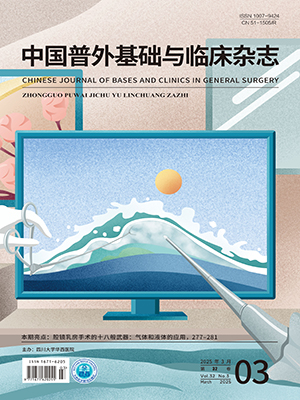| 1. |
Chen W, Zheng R, Zhang S, et al. Cancer incidence and mortality in China in 2013: an analysis based on urbanization level. Chin J Cancer Res, 2017, 29(1): 1-10.
|
| 2. |
Banerjee M, Muenz DG, Chang JT, et al. Tree-based model for thyroid cancer prognostication. J Clin Endocrinol Metab, 2014, 99(10): 3737-3745.
|
| 3. |
Fitzmaurice C, Akinyemiju TF, et al. Global, regional, and national cancer incidence, mortality, years of life lost, years lived with disability, and disability-adjusted life-years for 29 cancer groups, 1990 to 2016: A systematic analysis for the global burden of disease study. JAMA Oncol, 2018, 4(11): 1553-1568.
|
| 4. |
程若川, 刘文. 中国甲状腺癌术后随访和临床研究现状反思. 中国普通外科杂志, 2017, 26(11): 1375-1382.
|
| 5. |
Haugen BR, Alexander EK, Bible KC, et al. 2015 American Thyroid Association Management Guidelines for adult patients with thyroid nodules and differentiated thyroid cancer: The American Thyroid Association Guidelines Task Force on Thyroid nodules and differentiated thyroid cancer. Thyroid, 2016, 26(1): 1-133.
|
| 6. |
Beekers N, Husson O, Mols F, et al. Symptoms of anxiety and depression are associated with satisfaction with information provision and internet use among 3 080 cancer survivors: Results of the PROFILES registry. Cancer Nurs, 2015, 38(5): 335-342.
|
| 7. |
周嫣, 季梦婷, 张雁冰. 出院后患者随访服务现状与研究进展. 齐鲁护理杂志, 2014, 20(13): 53-55, 56.
|
| 8. |
冯翔, 田俊, 展阳妮, 等. 护士主导的随访护理研究现状. 中国临床护理, 2018, 10(6): 546-549.
|
| 9. |
郭颖, 郑蕾, 张世瑜, 等. 甲状腺微小乳头状癌根治术后的专科随访. 外科理论与实践, 2019, 24(3): 254-258.
|
| 10. |
刘志超, 曹家燕, 陈昌连. 以家庭为中心的健康教育在提高甲状腺癌术后患者甲状腺素服药依从性中的应用. 解放军护理杂志, 2017, 34(7): 65-67, 71.
|
| 11. |
范素云, 贾彦彦. 无缝隙健康教育在放射性131I治疗甲状腺癌患者中的应用. 上海护理, 2016, 16(6): 16-19.
|
| 12. |
於丽红, 苏胜偶, 葛艳红, 等. 电话随访干预对亚临床甲状腺功能减退症病人血脂和促甲状腺激素的影响. 护理研究, 2016, 30(13): 1611-1614.
|
| 13. |
张璟, 刘东玲, 高乔乔, 等. 甲状腺癌患者信息需求的研究进展. 中华护理教育, 2018, 15(9): 703-707.
|
| 14. |
张彩丽, 李冰, 杨杰, 等. 慢性乙肝病毒性肝炎病人随访需求调查及对策. 护理研究, 2014, 28(19): 2336-2338.
|
| 15. |
段丹, 宁宁, 陈佳丽, 等. 颈椎病术后患者随访服务的需求现状及影响因素的调查研究. 华西医学, 2019, 34(9): 1010-1016.
|
| 16. |
刘永兵, 窦新芝, 王淑霞, 等. 养老机构老年人健康素养与自我护理能力的典型相关分析. 中国老年学杂志, 2014, 34(5): 1349-1352.
|
| 17. |
林雨轩, 徐军美. 恢复质量量表QoR-15用于肝切除术后患者早期恢复质量的评估. 中南大学, 2014.
|
| 18. |
Spitzer RL, Kroenke K, Williams JB, et al. A brief measure for assessing generalized anxiety disorder: the GAD-7. Arch Intern Med, 2006, 166(10): 1092-1097.
|
| 19. |
何筱衍, 李春波, 钱洁, 等. 广泛性焦虑量表在综合性医院的信度和效度研究. 上海精神医学, 2010, 22(4): 200-203.
|
| 20. |
Cohen S, Kamarck T, Mermelstein R. A global measure of perceived stress. J Health Soc Behav, 1983, 24(4): 385-396.
|
| 21. |
杨廷忠, 黄汉腾. 社会转型中城市居民心理压力的流行病学研究. 中华流行病学杂志, 2003, 24(9): 760-764.
|
| 22. |
夏冰洋, 陈智群, 薛春梅, 等. 江苏省滨湖区2007-2016年育龄妇女死亡监测分析. 中国妇幼健康研究, 2018, 29(9): 1112-1115.
|
| 23. |
张璟, 李利梅, 李嘉音, 等. 甲状腺癌病人健康信息获取与需求状况调查. 护理研究, 2019, 33(22): 3872-3878.
|
| 24. |
Goldfarb M, Casillas J. Unmet information and support needs in newly diagnosed thyroid cancer: comparison of adolescents/young adults (AYA) and older patients. J Cancer Surviv, 2014, 8(3): 394-401.
|
| 25. |
Morley S, Goldfarb M. Support needs and survivorship concerns of thyroid cancer patients. Thyroid, 2015, 25(6): 649-656.
|
| 26. |
Lamers RE, Cuypers M, Husson O, et al. Patients are dissatisfied with information provision: perceived information provision and quality of life in prostate cancer patients. Psychooncology, 2016, 25(6): 633-640.
|
| 27. |
高学珍, 姚薇, 贾艳庆. 头颈部肿瘤患者对延续护理服务需求的调查分析. 护理研究, 2017, 31(35B): 4588-4590.
|
| 28. |
赵延慧, 李晓玲, 戴燕, 等. 日间手术患者延续性护理服务需求调查. 护理学杂志, 2018, 33(9): 88-91.
|
| 29. |
李小梅, 孙玉倩. 放疗癌症患者的应对方式及其社会支持的相关性. 中国慢性病预防与控制, 2011, 16(7): 557-559.
|
| 30. |
张静, 马小琴. 大肠癌患者的心理一致感、社会支持及生活质量的研究进展. 解放军护理杂志, 2013, 30(8): 39-41.
|
| 31. |
Molisani A, Dumenci L, Matsuyama RK. Influences of patient sociodemographics on cancer information received through the first 9 months of treatment. J Cancer Educ, 2014, 29(1): 158-166.
|
| 32. |
Martinez-Donate A P, Halverson J, Simon N J, et al. Identifying health literacy and health system navigation needs among rural cancer patients: Findings from the rural oncology literacy enhancement study (ROLES). J Cancer Educ, 2013, 28(3): 573-581.
|
| 33. |
Ryu J, Ryu YM, Jung YS, et al. Extent of thyroidectomy affects vocal and throat functions: a prospective observational study of lobectomy versus total thyroidectomy. Surgery, 2013, 154(3): 611-620.
|




